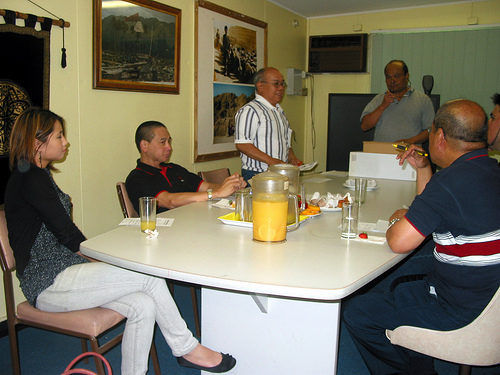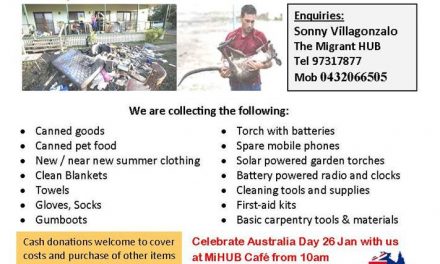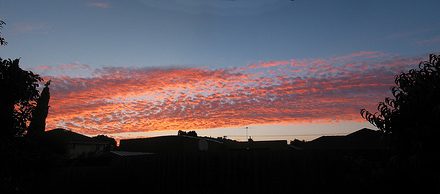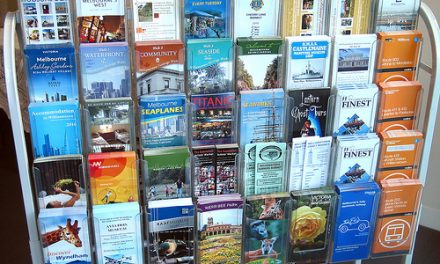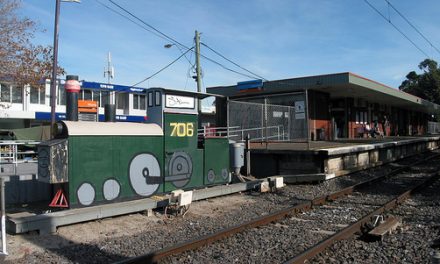One day while chatting with Walter Villagonzalo, the President of Migrant Hub, I told him my wife lacks the opportunities to practise speaking English, as her native language is not English and she is now staying at home to take care of the kids so she could not meet more people. He said “Why not attend our Kulcher Club?”
Kulcher Club is very similiar to Toastmaster Club – basically a club for members to improve their public speaking skills. Walter has been with the Toastmaster Club for a long time and had started a Toastmaster Club in Footscray for the Filipino community about 7-8 years ago. Realizing that a major difficulty faced by migrants is the proficiency in spoken English. he established the Kulcher Club at Migrant Hub, adapting the format from the Toastmaster Club. “Kulcher” is the pronunciation for the word “Culture”, for this Club embraces multiculturalism.
We attended the first Kulcher Club Meeting for 2011 last night. It started at 7 p.m. and ended at around 8.30 p.m. I will now describe its format though this may not be perfectly accurate or complete as I was preoccupied with pacifying my baby boy and hence, did not pay much attention to the proceedings.
Each meeting is chaired by a person (called the Toastmaster of the Day or Evening in Toastmaster Clubs; I am not sure what this role is called in this Club). The Meeting comprises several parts:
1. Elevator Speeches – so called because they are short 4-6 minutes speeches that you will normally engage in with other people while inside an elevator. You could be introducing yourself or talking about something that you encounter during the day.
2. Table Topics – this is chaired by the Table Topics Master who will select a theme/topic not known beforehand and randomly pick a person to give an impromptu response to his question. The Queensland Flood was the central topic for last night. His first question is on how you are affected by the Queensland flood. The second question is about what you did to help. I did not expect I was called for the third question which is about rebuilding after the flood.
3. Prepared Speeches – where usually 3-5 members give prepared presentations before the group. Daryl, the only lady shown in the photo below, gave a speech about conscience – the struggle between knowing what is wrong but beneficial to oneself and actually taking the step to carry out the right deed, against one’s inner temptations. Vic, the man besides her, talked about his mobile banking profession with NAB. The third speaker David was absent so Nora Simkin, the manager of the Migrant Hub Cafe, was asked to stand in. I only managed to listen to her first and last sentence, when she closed her speech by thanking God. This is because my son was quite unsettled so I had to take him out for a walk. But I guess she may be talking about the 3 foster children that were brought under her care, perhaps? (I will probably need to change the names of the speakers for I really could not recall their names.)
4. Education – in which the speaker presents an educational aspect. As Kulcher Club did not prepare a presenter for this session, I was asked to talk about my Altona Blog instead.
5. Evaluations – in a Toastmaster Club with more attendees, there is an Evaluation Master who will coordinate an Evaluator for each prepared speech and for the table topics speeches. As there are not many people last night, there is only one evaluator for all the speeches. The Evaluator will acquire skills in appraising positively (Praise-Improve-Praise or Commend-Recommend-Commend) so that the person being evaluated will be motivated to make improvements rather than losing confidence.
6. Feedback – is elicited from the visitors (my wife and I) on how they feel about the Meeting.
7. Closing the Meeting – in which the chairperson asks for volunteers to fill in the various roles for the next meeting.
In addition to the Chairperson, Table Topics Master, Prepared Speech Master and Speakers, Educational Speaker, Evaluation Master and Evaluators that I have mentioned, other possible roles may include the following:
- Invocator – who gives an inspirational opener.
- Wordmaster/Lexicologist – who presents a “word of the day” to help members increase their vocabulary, with the intention that members use this word in their presentations.
- Round Robin Master – this is a variation to the usual Table Topics, in which each person takes turn to speak on a common topic.
- Listener – who asks questions after the presentations to make sure everyone was listening.
- Grammarian – who notes mispronunciations, grammar mistakes, word repetition and positive uses of language.
- Ah-Counters – who keeps track of audible pauses such as “ah,” “er,” “um,” etc.
- Timer – who keeps track of how much time is taken for each presentation and has a buzz to give warnings that the designated time has been exceeded. Also gives a breakdown report at the end of the Meeting on how much time is spent on each session.
- Award Presenter – who presents awards at the end of the Meeting.
- General/Master Evaluator – who evaluates the entire Meeting.
You will probably be interested in knowing what are the differences between Kulcher Club and a typical Toastmaster Club. First, you will need to pay an annual membership fee for Toastmaster Club while this is free for Kulcher Club. There is a donation box, where you can contribute towards the dinner and refreshments prepared by Nora. Arrive at the venue earlier than 7 p.m. if you want to take your dinner at a leisurely pace before the Meeting.
The second notable difference is that the Kulcher Club provides a much more casual and relaxed environment. Some Toastmaster Clubs have a serious setting in which formal attire is expected of the participants and this could be intimidating to some people who are lacking confidence in public speaking. Due to space limitations, Kulcher Club members sit around a long table. The classroom or lecture theatre seating arrangement is the most common in Toastmaster Club meetings. However in some clubs, the presenter stands in the centre of a space enclosed in four corners by the audience. He will have to turn around during the presentation to make sure he is not neglecting any audience not facing him. I feel this is the most challenging and “scary” of all settings as you really feel “exposed” with audience watching you from all directions.
Toastmaster International was founded in 1924 and has grown to over 12,800 member clubs in 113 countries, currently serving over 260,000 members (Ref 1). It has developed a very comprehensive set of programs and materials, that guide members progressively from one level of difficulty to another. The members follow a manual which specifies the requirements to be fulfilled for the speech at each level of difficulty. Apart from communication and public speaking, it also provides leadership training. Toastmaster International hosts many competitions at the area, division, national and international level. In contrast, Kulcher Club is much less competitive. I doubt Toastmaster competitions are opened to non-members. Hence, Kulcher Club members will have very limited options if they wish to participate in competitions.
I guess Kulcher Club will appeal to those who need a relaxed and supportive environment to help them build the confidence in public speaking. It also provides an avenue for multicultural social interactions.
Kulcher Club Meetings are held fortnightly on Wednesdays from 7 to 8.30 p.m. at the Migrant Hub which is located at 240 Hoppers Lane, Werribee, opposite Werribee Mercy Hospital and besides Sistems Golf Park. The next meeting will be on 2nd February. All visitors are welcome. For any enquiry, you can email Walter Villagonzalo at mihub240@tpg.com.au.

